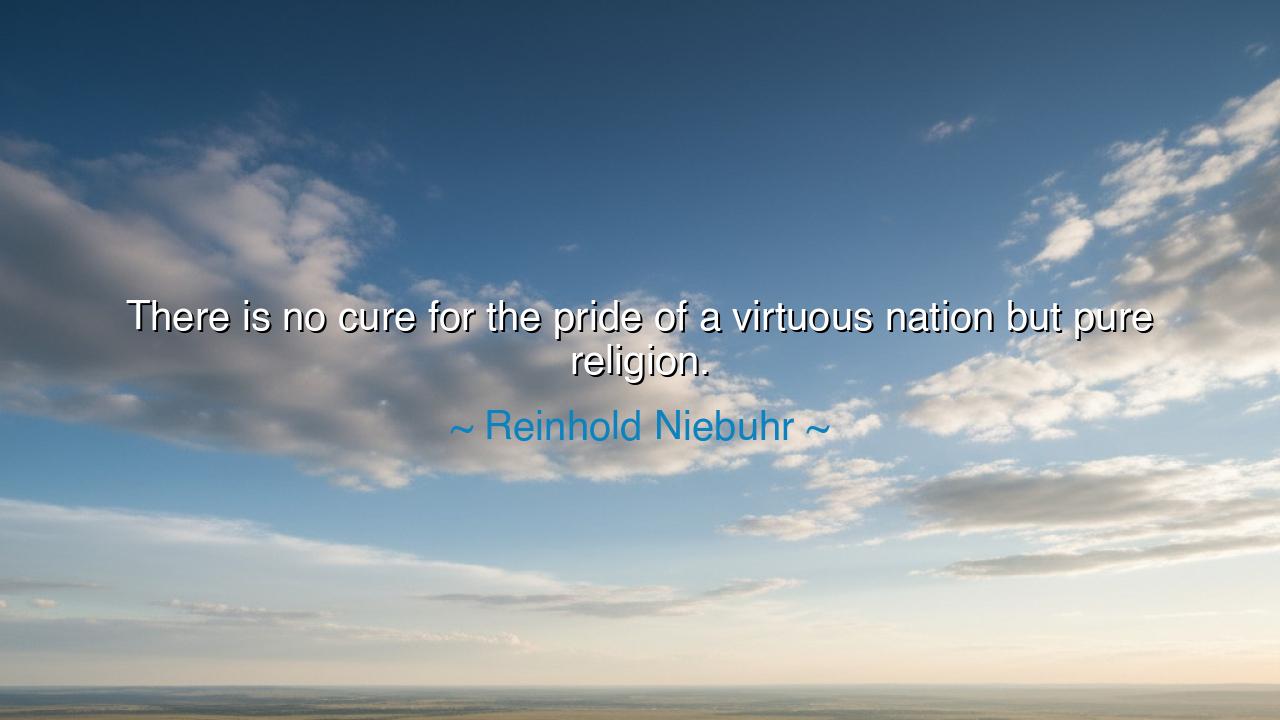
There is no cure for the pride of a virtuous nation but pure






In the solemn cadence of his wisdom, Reinhold Niebuhr, one of the great moral philosophers of the twentieth century, warned humanity with these timeless words: “There is no cure for the pride of a virtuous nation but pure religion.” This statement, though brief, carries the weight of centuries — a mirror held before the soul of civilization. Niebuhr, who lived through war and witnessed the rise and fall of ideologies, saw how even the noblest nations could fall into self-righteousness, how virtue, when untempered by humility, becomes pride disguised as goodness. His words speak not only to nations, but to all who believe themselves just — for he understood that pride is the most seductive of sins, especially when it hides behind the mask of virtue.
The origin of this insight emerges from the crucible of Niebuhr’s time — the era of the World Wars. He observed that even nations who fought in the name of peace and justice often believed themselves morally infallible. In their victory, they proclaimed their righteousness, forgetting that power — even used for good — corrupts when unexamined. Niebuhr, both theologian and realist, saw that moral pride was not limited to tyrants; it lived also in democracies, in the hearts of those who believed themselves the saviors of the world. His quote is a warning: when a nation forgets its flaws and sees its virtue as absolute, it begins to drift from humility toward destruction.
To understand this, one need only remember the story of ancient Israel in its days of glory. Chosen by God, it was given law, wisdom, and divine purpose — yet when it began to believe that chosenness made it superior rather than responsible, pride replaced reverence. The prophets, like Amos and Isaiah, rose to remind the people that their greatness came not from themselves, but from their faithfulness. When the people turned their devotion into arrogance, when they believed their virtue made them untouchable, their kingdom fell. Thus, Niebuhr’s warning echoes the prophets of old: no nation, however virtuous, is safe from pride.
He writes of the only cure — pure religion. But what is this purity? It is not the empty ritual or the dogma of zealots. Pure religion is humility before the Infinite; it is the knowledge that all human virtue is partial, all justice imperfect. It is faith that tempers strength with mercy, and reason with compassion. Pure religion reminds the powerful that they are servants, not gods; that their wisdom is dust compared to the wisdom of eternity. It teaches nations, as it teaches individuals, that goodness must always kneel before grace. Without this humility, virtue hardens into vanity, and righteousness becomes a sword that wounds rather than heals.
Consider the United States after the Second World War. Triumphant and prosperous, it stood as the beacon of freedom. Yet Niebuhr saw the seeds of pride even in victory — the danger that the nation would come to see itself as the redeemer of all others, rather than as one among many striving toward justice. His warning was prophetic. Over time, moral confidence often grew into moral superiority, and the belief in divine mission sometimes justified arrogance, even violence. Niebuhr’s call for pure religion was not a call for piety, but for humility — for a spiritual discipline that keeps even the righteous aware of their limits, their sins, their shared humanity.
The ancients, too, knew this truth. The Greeks told of hubris, the pride that blinds kings and topples empires. They taught that no mortal, however wise or virtuous, could defy the gods without ruin. In the same way, Niebuhr’s wisdom reminds modern man that moral pride — whether in individuals or nations — is the highest form of blindness. Only humility before the divine, only the recognition that goodness is never fully our own, can heal this blindness. The truly virtuous nation does not boast of its virtue; it acts justly, loves mercy, and walks humbly with its God.
So, my children, take this teaching into your hearts. Beware the pride that wears the robes of righteousness. When you believe yourself pure, seek your flaws; when you believe your nation holy, examine its sins. True virtue is never loud — it is silent, serving, and self-aware. Let your faith be the mirror that reveals your imperfection, and your love for others the measure of your strength. For only in humility can virtue remain pure, and only in reverence can power remain just.
Remember Niebuhr’s warning: pride is the shadow that follows even the brightest light. Therefore, guard your heart and your nation alike. Let pure religion — the spirit of humility, compassion, and gratitude — guide your path. For in that spirit lies not only the cure for pride, but the salvation of all who would call themselves good. And when the nations of the earth learn this truth, the world shall at last find peace — not the peace of conquest, but the peace of the humbled soul standing before the eternal.






AAdministratorAdministrator
Welcome, honored guests. Please leave a comment, we will respond soon